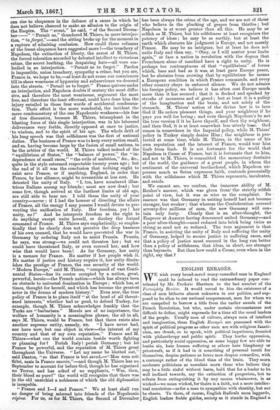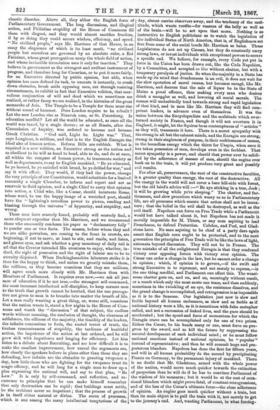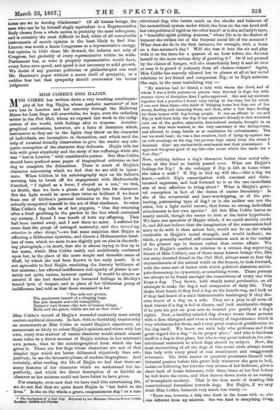ENGLISH ENRAGES.
WE wish every broad-acred many-consolled man in England could be induced to read the extraordinary paper con- tributed by Mr. Frederic Harrison to the last number of the Fortnightly Review. It would reveal to him the existence of a class of men hitherto almost unknown in our politics, and sup- posed to be alien to our national temperament, men for whom we are compelled to borrow a title from the earlier annals of the- French Revolution, but who, under certain circumstances not difficult to define, might supersede for a time all the usual leaders of the people. Usually men of culture, always men of intellect and imagination, these English Enrages are possessed with the spirit of political progress as other men are with religious fanati- cism, are drunk, so to speak, with political impatience, frenzied with philanthropy and public spirit. They loathe oppression, and particularly social oppression, as some happy few are able to loathe sin, hate human suffering as others hate blasphemy or priestcraft, as if it had in it something of personal insult for themselves, despise patience as brave men despise cowardice, with a contempt rather of the blood than of the brain. They scorn moderate politicians as moralists scorn those who believe they may be a little sinful without harm, hold that for a leader to be well inclined towards, say the extinction of pauperism, but to refrain from extinguishing it by any means whatsoever, is as wicked—we mean wicked, for theirs is a faith, not a mere intellec- tual conviction—as for a man to sympathize with chastity, but not be chaste. To them, of course, English Radicals seem laggards, English leaders feeble guides, society as it stands in England a
chaotic disorder. Above all, they abhor the English form of Parliamentary Government. The long discussions, and illogical action, and Philistine stupidity of the House of Commons fill them with disgust, and they would almost sacrifice freedom, if by so doing they could secure wisdom, efficiency, and speed.
"No civilized people," says Mr. Harrison of that House, in an essay the eloquence of which is its least merit, "no civilized people but ourselves are governed by an absolute ruler, a Roi Faineant, whose great prerogatives usurp the whole field of action, and whose invincible irresolution uses it only for inaction." They believe in government as the strongest and swiftest instrument of progress, and therefore long for Cassariam, or to put it more fairly, for an Executive directed by public opinion, but able, when opinion has once defined its task, to execute it instantly, to crush down obstacles, brush aside opposing men, cut through resisting circumstances, to exhibit in fact that Executive volition, that mar- vellous conjunction of will and deed which we sometimes see realized, or rather fancy we see realized, in the histories of the great monarchs of Asia. The Temple to be a Temple for them must rise without sound of hammer. Does London require to be rebuilt ? Let the new London rise as Nineveh rose, or St. Petersburg. Is education needful? Let all the world be educated, as once all the world was taxed, by a single decree ; or as all Russia, after due Commission of Inquiry, was ordered to become and became Greek Christian. "God said, Light be. Light was." That, says Longinus, is sublime, and that is to the English Enrages the ideal also of human action. Reform Bills are rubbish. What is required is a new volition, an Executive strong as the nation and as obedient to its will as hand to head, able to do, and do at once, all within the compass of human power, to transmute society as well as departments, to say to English mankind, "Be ye educated, be ye housed, be ye satisfied with bread, be ye drilled for war," and say it with effect. They would, if they had the power, change the very principle of our Constitution, would substitute for a limited monarchy a single Chamber, to inform and report and act as reservoir to fluid opinion, and a single Chief to carry that opinion into action, a Chief who, like a C mar, should incarnate Rome, whose word, to use the happy image of a wretched poet, should have the "lightning's soundless power to pierce, rending and blasting through the universe" of hypocrisy, and stupidity, and wrong.
These men have scarcely found, probably will scarcely find, a snore eloquent expositor than Mr. Harrison, and we recommend those who summarily condemn his paper as "declamatory folly" to ponder one or two facts. The masses, before whom they and we are alike powerless, are coming to the front in crowds, are beginning, if not to move, at least to stir, and rustle, and listen, and glance eyes, and ask whether a grey monotony of daily toil is all that the Creator intended His creatures to enjoy, whether, in- deed, the right of possession and the right of labour are to be to eternity disjoined. When Buckinghamshire labourers strike it is time for the happy to think, and unless we greatly mistake them, the millions, as they become conscious that they are millions, will agree much more closely with Mr. Harrison than with Members of Parliament. It requires even now,—we ask all just men of education if it be not true,—the strongest self-command, the most incessant intellectual self-discipline, to keep earnest men to the truth that growth cannot be hurried, that the one preroga- tive not given to man is to breathe into matter the breath of life. Let a man really wanting a great thing, or, worse still, conscious that the nation wants it, stand a few nights in the House of Com- mons and watch the "discussion" of that subject, the endless words without meaning, the confusion of thought, the clearness of selfishness, the silliness of the majority, the timidity of the leaders, the infinite concessions to fools, the rooted terror of truth, the tireless remonstrances of stupidity, the tardiness of healthful action, the impotence of the action at last ordered, and he will grow sick with impatience and longing for efficiency. Let him listen to a debate about Recruiting, and see how difficult it is to make the smallest improvement, how unreal the arguments are, how clearly the speakers believe in plans other than those they are defending, how infinite are the obstacles to granting twopence a day, how little those who are fighting for the twopence trust its magic efficacy, and he will long for a single man to draw up a plan expressing the national will, and say to that plan, "Be Law." It is only by self-command, and reflection, and re- currence to principles that he can make himself remember that only destruction can be rapid ; that buildings must settle, be the architect never so impatient ; that the process of growth is in itself either natural or divine. The scorn of processes, which is one among the many intellectual temptations of the
day, almost carries observers away, and the tendency of the mul- titude, which vtauts restilts—for reasons of the belly as well as of the brain—will be to act upon that scorn. Nothing is so instructive to English politicians as to watch the legislation of the individual States of North America, that is, of Englishmen set free from some of the social bonds Mr. Harrison so hates. Those Legislatures do not set up Camara, but they do constantly carry
strong laws, or invest individuals with exceptional powers to secure a specific end. We believe, for example, every Code yet put in force in the Union has been drawn oat, like the Code Napoleon, by a Committee, and accepted en bloc without chatter, but with a temporary paralysis of justice. So when the majority in a State has
made up its mind that drunkenness is an evil, it does not wait for the slow operation of moral causes, but becomes enrage, like Mr.
Harrison, and decrees that the sale of liquor be in the State of
Maine a penal offence, thus making every man who desires drink a-smuggler as well, and lowering all social morals. The
masses will undoubtedly tend towards strong and rapid legislation of that kind, and in men like Mr. Harrison they will find com- petent leaders, in advance even of themselves. It was the union between the Encyclopmdists and the multitude which over- turned society in France, and though it will not overturn it in England, it might, let the Squires be as contemptuous of " articles " as they will, transmute it here. There is a secret sympathy with the strong in all but the calmest minds, and the Enrages are strong, strong in their singleness of purpose, in their recklessness of means, in the boundless energy which the thirst for Utopia, when once it has taken possession of men, develops even in the feeblest. That secret sympathy is a power, and should that power ever be solidi- fied by the adherence of masses of men, should the engine ever hook on to the train, it will yet produce very great and possibly evil results.
For after all, perseverance, the root of the constructive faculties, is a greater quality than energy, the root of the destructive. All the energy in the world will not cover a bare hill-side with forest, but the old laird's advice will :—" Be aye sticking in a tree, Jock ; it will be growing while ye're sleeping." The chatter, and fac- tiousness, and slow procedure which weary us so in Parliamentary
life, are all processes which ensure that action shall not be imma- ture; that the belief in the evil shall be destroyed, as well as thern
evil itself. Napoleon can force on Free Trade while a Parliameat would but have talked about it, but Napoleon has not made it morally impossible for M. Thiess, or any man aspiring to lead Frenchmen, to defend Protection. Cobden, and Peel, and Glad- stone have. No man aspiring to be chief of a party dare again assert that English corn ought to be protected, and to the next generation the principles of Free Trade will be like the laws of light, axiomata beyond discussion. They will not be in France. The true mistake of all the enlightened Enrages is that they confound victory over opposing forces with victory over opinion. The Csesar can order a change in the law, but he cannot order a change in opinion ; which, if opinion is to govern,—if the swift and strong Executive is to represent, and not merely to repress,—is the one thing needful, and Parliament can effect this. The weari- some chatter goes on, and on, and on, seemingly without result, or a result which only the most acute can trace, and then suddenly, sometimes in the twinkling of an eye, the resistance dissolves, and the grand change is accomplished, and retrogression is as impossible as it is to the Seasons. Our legislation just now is slow and feeble beyond all human endurance, as slow and as feeble as if national history were a life, as it is sometimes with false metaphor called, and not a succession of linked lives, and the pace should be accelerated ; but the speed and force of momentum for which the Enrages crave can be accomplished only for one of two prices. Either the Caesar, be his heads many or one, must force on pro- gress by the sword, and so kill the future by suppressing the natural development of each individual mind ; or he must follow national emotions instead of national opinions, be " popular " instead of representative ; and then he will commit huge and pre- posterous blunders. Napoleon has done the first for fifteen years, and will in all human probability do the second by precipitating France on Germany, to the permanent injury of mankind. There is no doubt that Mr. Gladstone, armed with the whole power of the nation, would move much quicker towards the extinction of pauperism than he will do if he has to convince Parliament of the wisdom of his measures ; but it would be at the cost of occa- sional blunders which might prove fatal, of constant retrogressions, and of the loss of the Cassar's ultimate force—the close adherence of opinion. An engine goes much quicker without a train, but then its main object is to pull the train with it, not merely to get to the journey's end. And, wanting Parliament, in what forcing- house are we to develop Gladstones? Of all human beings, the man who can be by himself singly equivalent to a Representative Body chosen from a whole nation is probably the most infrequent, and is certainly the most difficult to find, while of all conceivable instruments of search opinion is the least likely to find him. Lincoln was worth a dozen Congresses as a representative energy, but opinion in 1860 chose Mr. Seward, the inferior not only of Congress, but probably of every representative within its walls. Parliament has, or were it properly representative would have, every force save speed, and speed is not necessary to solid growth. We doubt if any genuine politician or philanthropist can read Mr. Harrison's paper without a secret thrill of sympathy, or a sudden fear lest that sympathy should overmaster his better judgment.
































 Previous page
Previous page